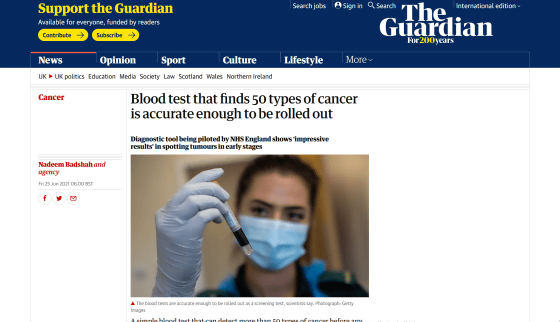A groundbreaking blood test that can detect more than 50 types of cancer is finally in the stage of large-scale testing

Clinical validation of a targeted methylation-based multi-cancer early detection test using an independent validation set --Annals of Oncology
https://www.annalsofoncology.org/article/S0923-7534(21)02046-9/fulltext
Blood test that finds 50 types of cancer is accurate enough to be rolled out | Cancer | The Guardian
https://www.theguardian.com/society/2021/jun/25/blood-test-that-finds-50-types-of-cancer-is-accurate-enough-to-be-rolled-out

Grail has developed a blood test method to determine the presence or absence of cancer, focusing on the pattern of DNA methylation in cell-free DNA that flows into the blood when cancer cells are destroyed by immunity. In March 2020, AI was trained with blood samples collected from cancer patients, and more than 50 types of cancer such as breast cancer, esophageal cancer, stomach cancer, ovarian cancer, lung cancer, multiple myeloma, and pancreatic cancer Announced that it was able to detect cancer.
Research results that more than 50 types of cancer can be easily screened with a new blood test using AI --GIGAZINE

A new test analyzed the accuracy of blood tests developed by Grail in a total of 4077 subjects, including 2823 subjects with cancer and 1254 controls. The subjects were people living in the United States, and each group consisted of age groups between the ages of 21 and 85. In addition, the average age was 62.6 years in the cancer patient group and 56.2 years in the control group, and the cancer patient group was slightly older.
Analysis revealed that Grail's blood tests detect the presence of cancer with an average sensitivity of 51.5% ( true positive rate) across all cancer patients. In addition, in the control group, it was diagnosed that it was not cancer with a specificity of 99.5% (true negative rate), so it is clear that it is very unlikely that non-cancer patients will be misdiagnosed as having cancer. became.
Sensitivity varied with the stage of the cancer, with stage I at 16.8%, stage II at 40.4%, stage III at 77.0%, and stage IV at 90.1%. Furthermore, the sensitivity of 'solid tumors without general screening test methods (esophageal cancer, liver cancer, pancreatic cancer, etc.)' was 65.6%, and 'solid tumors without general screening test methods (solid tumors with general screening test methods)'. The sensitivity of 'breast cancer, colon cancer, cervical cancer, prostate cancer)' was 33.7%, and the sensitivity of 'blood cancer (malignant lymphoma, myeloma, etc.)' was 55.1%.

Dr. Eric Klein, lead author of the paper and director of the Glickman Urological and Kidney Institute at the Cleveland Clinic, said early detection of cancer could increase the chances of successful treatment and reduce the burden on cancer patients. Claim to be able. 'These data suggest that combining tests that can detect multiple cancers with existing screening tests can have a significant impact on how cancer is detected and ultimately in public health.' Said.
The test was conducted on people who have already been diagnosed with cancer, but Dr. Peter Johnson, director of cancer clinical practice at the National Health Service (NHS) , said, 'The latest study says,'Can treat. It provides further evidence that such blood tests can help the NHS's ambitious goal of detecting three-quarters of cancers at an early stage, which is likely to occur. ' In the fall of 2021, the NHS will work with Grail to test 140,000 subjects, with results expected to be reported in 2023.
Related Posts:
in Science, Posted by log1h_ik






